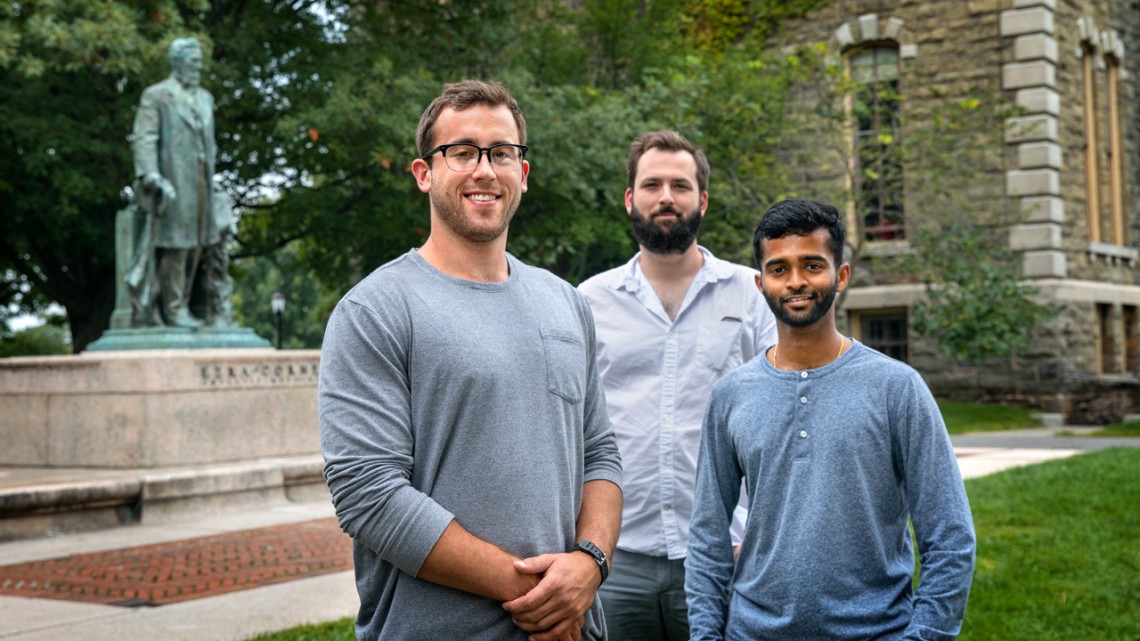
Student veterans Ryan Kokell ’19, Adam Klier ’19 and Piragash Swargaloganathan ’19 were selected to attend the 2018 Student Veterans of America Leadership Institute, Sept. 20-23, in Washington, D.C.
Student veterans recognized for leadership potential
By Nancy Doolittle
Student veterans Adam Klier ’19, Ryan Kokell ’19 and Piragash Swargaloganathan ’19 have been selected to attend the 2018 Student Veterans of America (SVA) Leadership Institute, Sept. 20-23, in Washington, D.C.
Institute participants were chosen from SVA chapters at college campuses nationwide based on the strength of their professional and leadership experience, their role in the SVA and a video each submitted on the transition from the military to higher education. The Leadership Institute will help them hone their leadership skills; ideal candidates for the institute are open to new ideas, have a passion for learning and are eager to collaborate with others.
Klier, from Lexington, Kentucky, says that when he left the U.S. Army as a sergeant working as an Arabic linguist, he spent nearly two years trying to determine his next career move, unaware of the resources available. He studied at the University of Kentucky before transferring to Cornell, where he is majoring in urban and regional studies in the College of Architecture, Art and Planning. “I have appreciated the caliber of students at Cornell and the quality and depth of their differing perspectives,” he said.
Klier hopes to use his Leadership Institute experience to help further support student veterans at Cornell, drawing from his transition to civilian life to help other veterans in theirs. He also is looking forward to meeting veterans from around the country at the institute. “It never hurts to know a few good people,” he said.
In 2012 Kokell, from Long Island, New York, joined the United States Marine Corps, where he achieved the rank of corporal as a helicopter weapons technician. Honorably discharged in 2015, he spent his freshman year at Pennsylvania State University before transferring to Cornell, where he is majoring in hotel administration.
A first-generation college student, Kokell is vice president of the Cornell Undergraduate Veterans Association (CUVA). He said he appreciates how Cornell integrates its student veterans with other Cornellians in the classroom, and he has worked with CUVA and senior administration to streamline student veterans’ admission, enrollment and financial aid processes.
Kokell wants to use the opportunities the Leadership Institute offers to share his experiences in higher education with other student veterans, as well as learn from other SVA leaders who have made their schools better for veterans.
Originally from Sri Lanka, Swargaloganathan is a former U.S. Navy hospital corpsman who served at Walter Reed National Military Medical Center in Bethesda, Maryland. He decided to pursue a medical career after leaving the military and participated in the 2015 Warrior Scholar Project at Syracuse University. That experience gave him the confidence to come to Cornell. Here, he is majoring in human biology, health and society in the College of Human Ecology and working as a research assistant. He said the “hypercompetitive” nature of Cornell has been challenging, but it also has helped prepare him for medical school.
Swargaloganathan is an active member of the Ithaca community, Cornell veteran community and border veteran community. He has continued to work with the Warrior Scholar Project as well as the Service to School program, to help other veterans seek out Ivy League institutions for their higher education.
Cornell has about 30 undergraduate student veterans – six of whom are women – and 50 graduate student veterans. In May 2017, Provost Michael Kotlikoff said he would like to increase the number of undergraduate student veterans to 100 by 2020. Also in 2017, the Adelphic Cornell Educational Fund committed $200,000 to support a new student veterans advocate position, held by Barbara Thompson and funded through a three-year grant. She serves as a point of contact for all student veterans, providing support, advocacy, programming and referral; Thompson’s office is at 101 Day Hall.
“Cornell produces leaders who graduate and go on to lead in government, in private organizations, in law, in public policy,” Kokell said. “It is important for non-veteran student leaders to personally know veterans, so they can think seriously about how their decisions as a leader can affect all those who serve in the military.”
Media Contact
Get Cornell news delivered right to your inbox.
Subscribe
